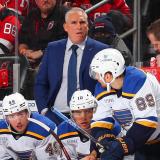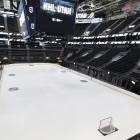 |
| Gaborik has four goals, six assists this postseason. (Getty Images) |
One of the issues that John Tortorella's curt press conferences overshadowed from Game 2's 3-2 Rangers loss to the Devils was the quiet night for Marian Gaborik. And by quiet I mean the missing person's report that was put out on him in the third period before the search party was eventually called off when he was spotted on the ice.
The Rangers forward who was third in the entire NHL this season in goals with 41, was left on the bench for the first 13 minutes of the third period. He saw as much ice time as Martin Biron. Imagine that, a team that needed a goal to get back even in the game stuck its best scorer's rear to the pine for the majority of the final period.
The message seemed clear enough, even if Tortorella refused to talk about it after the game (what else is new?) But he did expound at least a little bit in general terms in his conference call with the media on Thursday. While not specifically addressing Gaborik, his response to a question about giving and taking away ice time as reward/punishment was obviously meant in regards to Gaborik. And so was Torts' response.
"I think all coaches do it. You're trying to put players into situations that are going to try to help you to win games or help you in certain situations and momentum swings," Tortorella said. "Conversely, some guys when you just don't think it's working, they don't see the ice or they don't get the minutes. So those are decisions that we make every game.
"You guys like calling them benchings and all that stuff, but as coaches we're trying to find a way to win a hockey game, and we make decisions accordingly."
Of course Tortorella won't confirm it, but the ongoing assumption is that the long time between shifts was a result of Gaborik's defensive play on the Devils' second goal in the second period. Here's the play, keep an eye on Gaborik who fails to get the puck out of the zone and then doesn't sell out a la Ryan Callahan to block a shot from Bryce Salvador, one that went in off Ryan Carter's stick.
The crux of the matter, so it would seem, comes down to the fact that Gaborik isn't defending the way that John Tortorella demands. Here's where I start to get a bit lost on the methods of a coach.
The long-held belief is that defense wins championships. You defend the best, you win. So a guy standing up like a stick instead of going kamikaze and diving to the ice to sacrifice their body to become a human speed bag isn't going to look very good. It led to Gaborik playing just 15:21 in the game, his fewest minutes since March 2.
But what I'm starting to wonder is how much of that is manufactured. What I mean by that, is this something that's the result of coaches believing it and thus making it a reality, that it's just tougher to score in playoff hockey?
It seems almost impossible to fathom these days, but this season the Rangers could actually score. They were actually 11th in the NHL in goals for. They have gone 15 straight games now without scoring more than three goals. In only four of those games did they even reach three. Altogether, the Rangers are averaging 2.12 goals per game in the playoffs, well behind their pace of 2.71 in the regular season.
Conversely they are giving up fewer goals, too. They are playing a strong defensive style in the playoffs, blocking shots without abandon. Sure, that's something they did in the regular season but there is a higher expectation of it now. Hence, Gaborik's absence for a good part of Game 2. He's an offensive, finesse player. What he does best is score goals, not stop them from being scored.
It has led to giving up just 1.81 goals against per game. Compare that to the 2.22 they surrendered in the regular season and it's clearly improved.
But to have a little fun with math, average out those numbers. It shows that the Rangers now have a goal differential of 0.2 goals per game worse than they did in the regular season. That's a pretty significant change. Extrapolate that out to a full 82-game schedule and the Rangers' plus-39 becomes plus-23.
Maybe that's as attributable to the fact that they are playing playoff teams on a nightly basis, that's certainly a variable at work too. They aren't vastly superior to the teams their playing.
Just where I get lost is why change the way they play? The Rangers ran to the second-best record this season in the NHL and the No. 1 seed in the East and then when the postseason starts the team loses its aggressiveness? They showed over 82 games that they were superior to the other teams in the East, and that's a pretty good sample size to draw from.
I don't want to come off as questioning Tortorella too much here, he's won a Stanley Cup and I watch games from the press box and/or my desk. I just don't get what changes so much other than the name of the game and the paint on the ice indicating it's the playoffs. The Rangers played the Devils six times this season, two of those games they scored four goals.
Of course I'd be remiss if I didn't mention Gaborik has a reputation for not being a playoff performer. Over the course of his career Gaborik has scored an average of 0.45 goals per game during the regular season. In the playoffs that goes down to 0.34. Interestingly enough his points find the same exact ratio in difference, going from 0.90 in the regular season vs. 0.68 in the playoffs.
Before Gaborik scored the game-winning goal in that triple-overtime win vs. the Capitals in the second round, I was getting ready to rip Gaborik pretty good for not being around for the Rangers. Still, a team that is not scoring a whole lot can't really afford to keep a goal-every-other-game guy on the bench. The potential to score is always there with Gaborik, it doesn't help when he's manning one of the doors on the bench.
For more hockey news, rumors and analysis, follow @EyeOnHockey and @BrianStubitsNHL on Twitter and like us on Facebook.




















